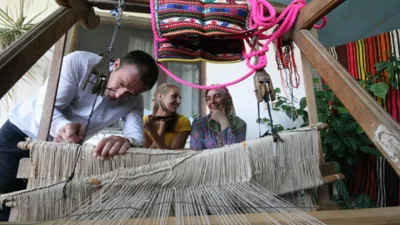Summary
The ‘Baba Residence’ programme, a key project of the ‘Ideas Factory’ initiative, connects urban youth with elderly people from Bulgarian villages for three to five weeks. The programme combines research, design thinking and rural traditions. Young participants live in the households of the rural elderly to learn about and help preserve cultural practices.
They receive training in human-centred design and social entrepreneurship, then work together with their rural hosts to develop new ideas and solutions to village issues. As a result, specific products, services and initiatives based on local knowledge are developed to answer specific needs of villagers.
The pilot issue of the initiative placed 17 youths in four villages in the Rhodopi mountains in summer 2015. Since then, more than 200 residents and 5 000 elderly have engaged in the programme and benefitted from the fresh perspectives and practical solutions that emerged from the collaboration.
Results
Since its launch in 2015, the Baba Residence programme has operated in five different regions in Bulgaria. Since 2020, the programme has focused on expanding its network and addressing community needs through various initiatives, such as:
- a knitting cooperative of elderly women in the north-west region’s rural areas, which collaborates with designers and sells products wholesale to IT companies;
- three ongoing local festivals to brand and position local cultural heritage;
- a CD recording of Bulgarian Muslim folklore, preserved in the Bulgarian National Radio archive;
- numerous fundraising and volunteer campaigns, including distributing 700 computers to rural children during the COVID-19 pandemic;
- over 150 cultural events in rural areas, addressing the issue that 89% of local residents had not attended a cultural event in the previous year;
- a vibrant network of artists, researchers, and 30 villages, based on long-term collaboration;
- advocacy for access to culture and compiling a national index highlighting low cultural participation in rural areas;
- water source, school, and cultural centre restoration;
- co-creation of local products with designers, which are sold at various markets;
- facilitation of sustainable relationships between foundations, funders, and capable villages.
Resources
Documents
Context
Bulgaria is experiencing the fastest population decline in the world, resulting in severe economic, social, and cultural impacts, particularly in rural areas. These areas face significant deficits, exacerbated by high emigration, demographic crisis, and economic centralisation in a few urban centres. In villages, 65% of residents are elderly, with limited access to healthcare, culture, and social services.
The Baba Residence initiative addresses these challenges through a participatory, intergenerational approach. It fosters connections between rural and urban areas by engaging urban young professionals in village life, using human-centred design to democratise resources and create sustainable linkages.
Objectives
-
Co-creation of community-led innovations and rural revitalisation;
-
Decentralisation of culture and capacity building of rural socio-cultural mediators to connect local resources and deficits to broader networks and possibilities;
-
Democratisation of resources and advocacy to include rural voices in policymaking.
Activities, key actors, and timeline
The model for rural development follows a straightforward sequence of activities aimed at fostering sustainable change in depopulating villages:
-
The process begins with the selection of a village based on criteria such as evident depopulation trends, a minimum population of 200 inhabitants, and local recognition of the need for human-centred or eco-centred progress.
-
Once a village is chosen, the main challenges, needs, and aspirations are identified collaboratively through participative methodologies, culminating in a central topic for the residency.
-
An open call is then issued to potential youth participants, including researchers, artists, social entrepreneurs, and experts in various fields, depending on the village's specific needs.
-
The project team then works with the local households and local authorities to create the space and opportunities for the different actors to meet and interact.
-
The team develops a programme for the selected participants to co-create with local elders and youth, if present. The programme ensures active participation of local cultural centres, public authorities and media.
-
The collaborative activities in the Baba Residence model are based on human-centred design principles. These include engaging with the local community to identify the needs, ideating solutions, prototyping interventions, and testing them to ensure they meet the actual needs and aspirations of the residents – all this during the selected residents' stay.
-
Long-term ideas are presented to the community for feedback, ensuring local ownership and sustainability. These ideas are then implemented, with the community playing a key role in maintaining the initiatives.
Success factors/lessons learnt
The Baba Residence programme is highly adaptable to various contexts and is currently being replicated across Bulgaria and internationally, including in Turkey. The strength of this model lies in its ability to connect innovative urban thinkers with some of the most remote and isolated areas, establishing multi-layered links: between generations, cultures, disciplines, and sectors. It addresses the dual challenge of younger generations experiencing loneliness and rural elderly being at risk of social isolation.
Human-centred design is at the core of the approach, transforming the model into a participatory co-design practice, contributing to democratic processes and enhancing rural representation in both local and national decision-making.
Contacts
Yanina Taneva, yanina.taneva@gmail.com, +359 876555190

